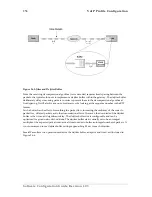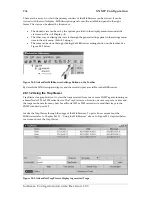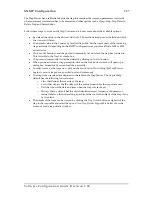
272
VoIP Debugging
Mode
Administrator execution
Command
Purpose
Step 1
node
#show session-control subsystems
[
detail-level
]
Show registered subsystems
Step 2
node
#show session-control sessions [
detail-
level
]
Show open VoIP data sessions
Step 3
node
#debug session-control [
detail-level
]
Enable the session-control debug
monitor to show exchanged data
between ISDN and VoIP protocols.
Step 4
node
#session-control close [
session-id
]
Close an established VoIP session
manually, enter 'all' to close all
sessions.
27.11 Debug Voice Over IP Data
To identify problems on your VoIP connection regarding no or wrong tones or wrong codecs, you
can get debug information from the DSP (Digital Signal Processor) with the DSP commands, or from
the Directpath (Path of the voice packets) with the voip-data command.
The debug information of the DSP contains the configuration of the DSP, e.g. echo-canceller, voice
volume etc. The debug information of the Directpath shows information of the configuration and
data flow errors in the Directpath, for example dejitter-buffer status or tone controller messages.
Procedure
To obtain information about Voice Over IP data
Mode
Administrator execution
Command
Purpose
Step 1
node
#show dsp
slot-number
Show the status of the DSP ports
Step 2
node
#debug dsp [
detail-level
]
Enable the DSP debug monitor to show
the DSP configuration for a call over an
DSP port
Step 2
node
#debug voip-data [
detail-level
]
Enable the voip-data debug monitor to
get information about the data flow
over the directpath.
27.12 Check Event Logs
The event logs contain warnings and information from the system components of SmartWare. In case
of problems it is often useful to check the system or the supervisor logs for information about
malfunctioning system components. The system event log stores general events such as flash full,
DSP failed etc., comparable with the event log on Windows NT. The supervisor log stores
Software Configuration Guide, Revision 1.03






























